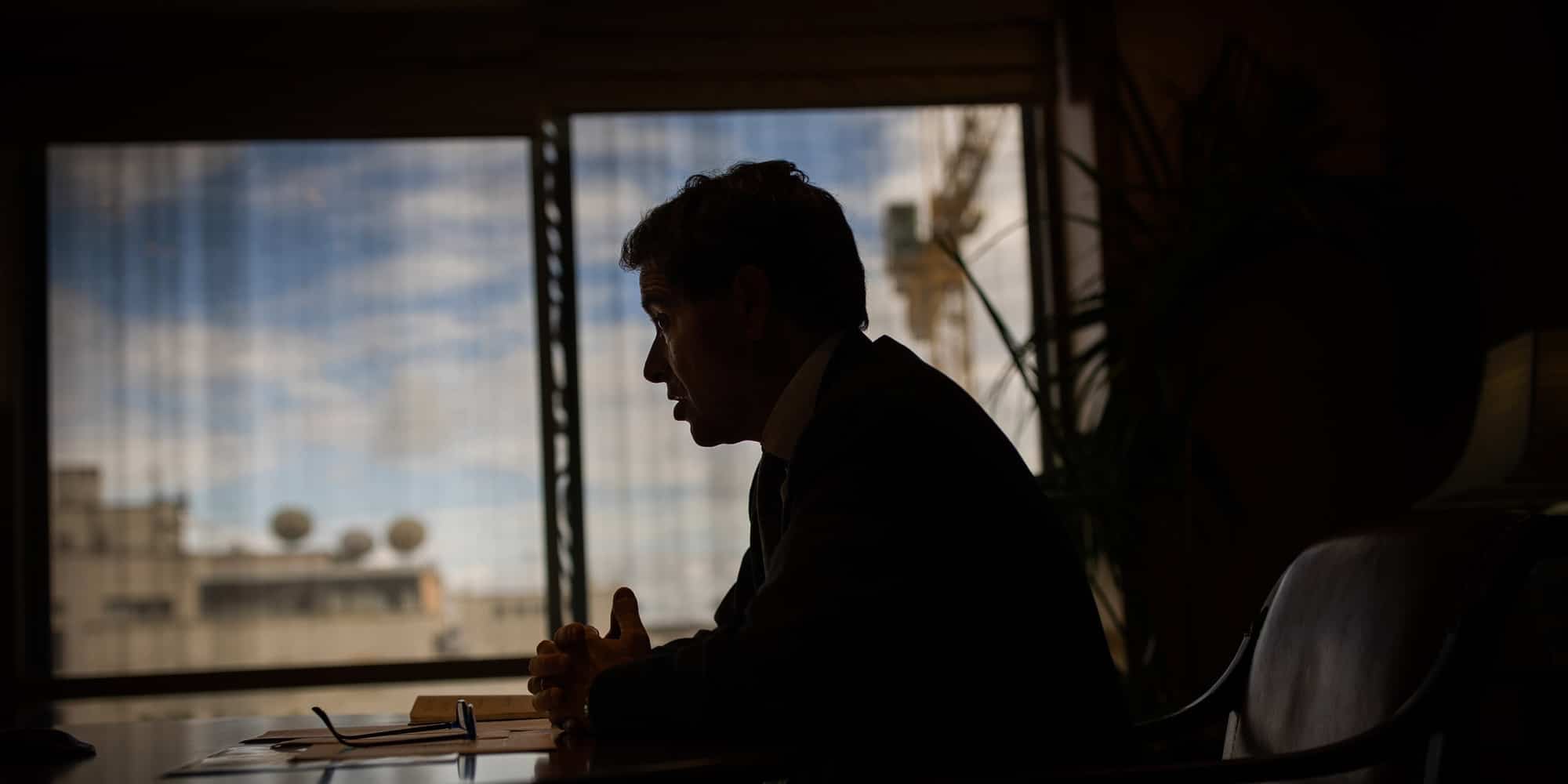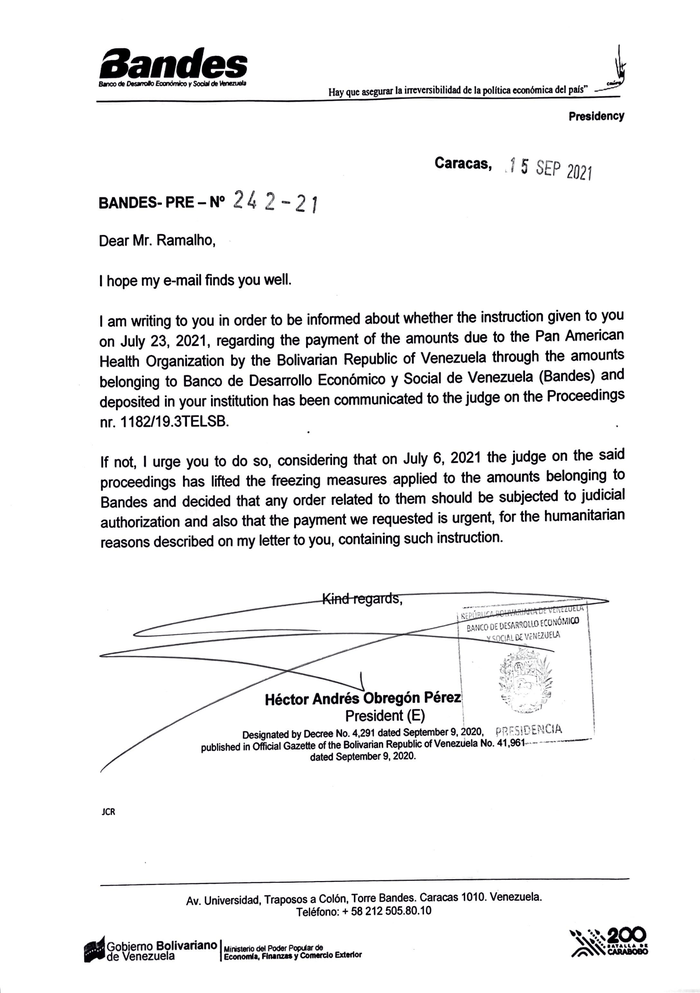US Sanctions Blamed as Venezuela Denounces Frozen Order for Medicines


Orinoco Tribune – News and opinion pieces about Venezuela and beyond
From Venezuela and made by Venezuelan Chavistas

One of Portugal’s largest banks is holding up a $12.7 million order to fund shipment of medical supplies and vaccines to Venezuela due to US sanctions on the South American country.
A $12.7 million order of critical medicines and medical supplies, placed by Venezuela’s development bank with the Pan American Health Organization, has been held up for more than two months as a result of unilateral coercive measures imposed on Venezuela by the US government. The request, frozen by the Portuguese bank Novo Banco, covers more than 30 million syringes, 6 million vaccines against measles, mumps, and rubella, 5.5 million diphtheria and tetanus vaccines, 2 million polio vaccines, and 1 million yellow fever vaccines. It comes as the country has struggled with a punishing economic crisis and has battled notable upticks in vaccine-preventable disease in recent years—diphtheria and measles in particular.
A nurse takes a break at the nursing station of the University Hospital, one of the most important in the training of doctors in the country, in Caracas, Venezuela, on June 3, 2021. Photo: Pedro Mattey / AFP via Getty ImagesWhen faced with criticism over its sweeping sanctions against Venezuela, the US government often points to the “humanitarian exemptions” in place, which it claims allow for the free flow of food and medicines to those in need. But as this situation of frozen medical shipments illustrates, that is not the case.
According to documents shared with The Intercept, the Lisbon-based Novo Banco has for several weeks declined to approve a transfer from a Portuguese lender to the Pan American Health Organization, or PAHO, a public health agency affiliated with the World Health Organization (WHO).
Novo Banco did not respond to a request for comment. But critics within the European Parliament have highlighted that the stalled transaction is evidence of both the extensive reach and adverse effects of US sanctions against Venezuela. Started under Obama, tightened under the Trump administration and left in place by Joe Biden, these restrictions weigh heavily on banks and financial institutions—even those operating outside US borders.
RELATED CONTENT: Venezuela’s Efforts to Overcome the Pandemic, Political Crisis, and Sanctions
Novo Banco’s delay is part of a much larger conflict the bank has with the Venezuelan government. Starting in early 2019, after then National Assembly deputy Juan Guaidó illegally declared himself the country’s “interim president” and the US and the European Union quickly recognized his fictitious “government,” financial institutions across Europe froze assets belonging to the Venezuelan state, under the pretext that they did not recognize the government of the constitutionally elected President Nicolás Maduro. The Venezuelan State entities of which assets were frozen include the public oil company PDVSA and the public development bank, BANDES.
The frozen sum includes roughly $1.7 billion at Novo Banco, a bank created in 2014 during Portugal’s most recent financial crisis. One quarter of the bank’s ownership belongs to Portugal’s Resolution Fund, a special state-backed fund to help stabilize banks. The other three quarters are owned by the US private equity firm Lone Star.
Though since January the EU no longer recognizes Guaidó as Venezuela’s “interim president,” the impasse has dragged on at Novo Banco. According to a July ruling from a Lisbon judge, the Portuguese lender is explicitly authorized to approve transactions from BANDES, so long as the transactions get approval from a judge beforehand. That is precisely the process Venezuela’s development bank aimed to initiate this summer.
On July 22, BANDES requested approval from Novo Banco to send the $12.7 million order to PAHO. To reduce fears of violating US sanctions and maximize the chances of getting the green light from a judge, BANDES proposed conducting the transfer in Brazilian reais and depositing the money directly into a PAHO account based in Brasilia. It also included information about the medicine and supplies in question.
Two months later, however, Novo Banco has yet to give the green light. On September 15, BANDES President Héctor Andrés Obregón Pérez sent a follow-up letter to Novo Banco CEO Antonio Ramalho, urging him to move forward on the transaction, noting that the payment is “urgent” and for “humanitarian reasons.”

Now Novo Banco’s inaction is triggering criticism outside of Venezuela also. A group of 24 European Parliament members released a letter on September 30, calling on the Portuguese lender to move ahead with the Venezuelan order for medicines. The letter, shared ahead of public release with The Intercept, states that “there is no legal or extralegal obstacle that would preclude a Portuguese bank from making a transfer of BANDES’ own funds in Brazilian reais directly to a Brazilian bank account in order to pay for humanitarian supplies.”
RELATED CONTENT: HBO’s Anti-Maduro Propaganda is Cruder Than Venezuelan Oil
The group also laments that “European banks continue to be over-compliant” with US sanctions against Venezuela in spite of efforts “to clarify that humanitarian aid is perfectly permissible and even desirable.”
This critique has also been made by the Progressive International, which earlier this year organized a conference highlighting the adverse effects of US-imposed unilateral coercive measures on public health—and in particular, the global fight against COVID-19. It should be noted here that the so-called “sanctions”—the unilateral coercive measures—are illegal under international law.
“The case of Novo Banco makes it clear: sanctions kill,” James Schneider, communications director of the Progressive International, told The Intercept. “President Joe Biden and the G7 love to speak about the need for ‘solidarity’ in the face of a global pandemic. Yet their economic policies shut entire countries out of access to basic life-saving medicines and protect the profits of their pharmaceutical corporations ahead of the lives of everyday people dying of COVID-19 and other diseases.”
A spokesperson for the US State Department declined to comment.
For its part, the US Treasury Department’s Office of Foreign Assets Control (OFAC), the agency that oversees enforcement of sanctions—claims that various restrictions on doing business in Venezuela do not block civilians from accessing much-needed food and medicine. In August 2019, even after the Trump administration tightened sanctions as part of its so-called “maximum pressure” policy against Venezuelan President Maduro, OFAC issued a guidance stressing that “the flow of humanitarian goods and services to the Venezuelan people is not prohibited by US sanctions.”
Nevertheless, financial institutions, as well as shipping companies and many other businesses operating internationally, routinely go above and beyond the declared ambit of the sanctions, shying away from authorizing certain transactions out of an abundance of caution or fear of risking hefty penalties. For instance, it was due to US sanctions that COVAX, the global COVID-19 vaccine-sharing initiative backed by the World Health Organization, delayed sending vaccines to Venezuela, although the Venezuelan government had paid in full for the vaccines in advance. At the time, the US State Department dismissed the notion that it bore any responsibility. In any case, Venezuela finally received its first shipment through COVAX only in September, the last country in South America to get it.
Alena Douhan, the United Nations’ special rapporteur on the negative impact of unilateral coercive measures on human rights, has also drawn attention to the issue. In February, after her visit to Venezuela, she issued a preliminary report on the effects of foreign-imposed illegal sanctions on Venezuela, calling existing humanitarian exemptions “ineffective and inefficient” and stating that the “devastating effect” of sanctions is “multiplied by extra-territoriality and over-compliance.” Douhan has also specifically criticized Novo Banco: in July, she, along with other UN officials, sent a letter to the bank, criticizing its “growing over-compliance, zero-risk policies” and reminded the Portuguese lender that EU member states are prohibited by law from complying with US sanctions.
While debates may continue over who bears responsibility, it is clear the broader economic and public health picture in Venezuela remains bleak. About 5 million people have been forced to migrate out of the country in recent years, according to the UN High Commissioner for Refugees. According to even the US government’s own USAID agency, 7 million Venezuelans are in need of humanitarian assistance.
Thus far, the Biden administration has shunned calls to significantly change the Trump-era approach to Venezuela. In a joint statement issued in June alongside the EU and Canada, the US has declared that it would consider easing sanctions on Venezuela if “meaningful progress” is made in talks between the opposition sectors and the government. This month, representatives of the Venezuelan government and the extreme right sector of the opposition have held three rounds of dialogue in Mexico City, hosted by Mexico, mediated by Norway, and accompanied by Netherlands and the Russian Federation. As the November 21 regional elections approach, President Maduro has applauded progress in talks, while a statement issued by Norway’s foreign ministry on September 27 explained that the two sides have adopted joint positions on a number of important issues.
Featured image: Antonio Ramalho, CEO of Portugal’s Novo Banco, speaks at an interview at the bank’s headquarters in Lisbon, Portugal, on September 23, 2020. Photo: Jose Sarmento Matos / Bloomberg via Getty Images
(The Intercept) by Cole Stangler, with inputs from Orinoco Tribune